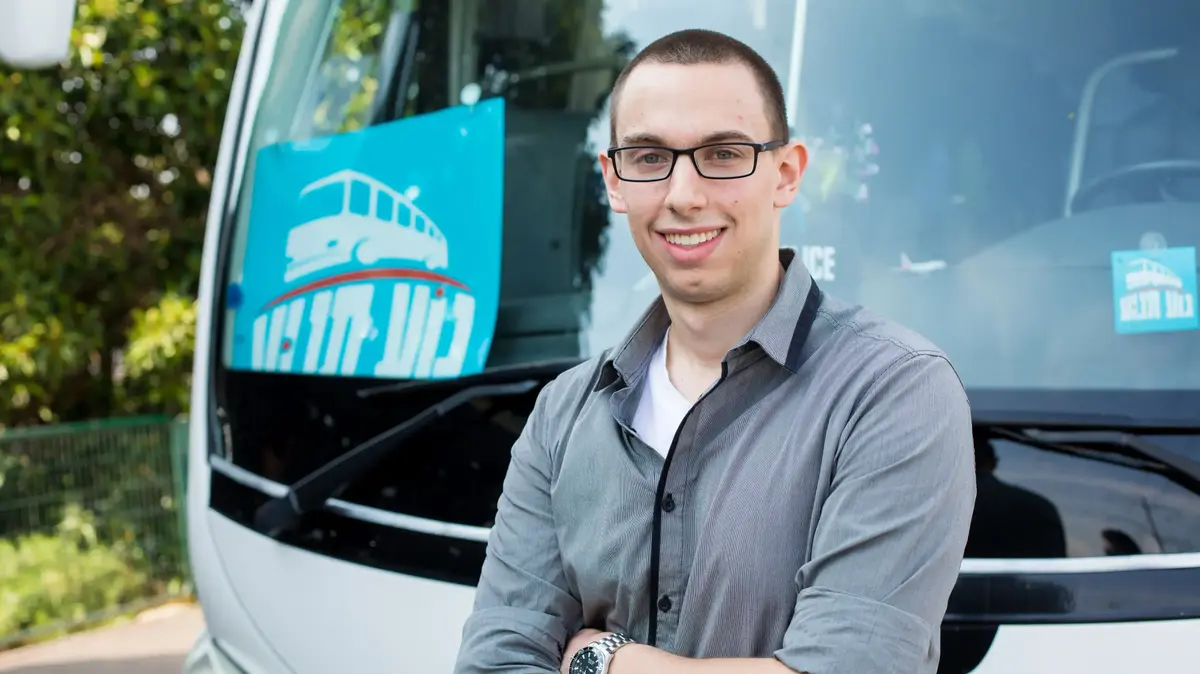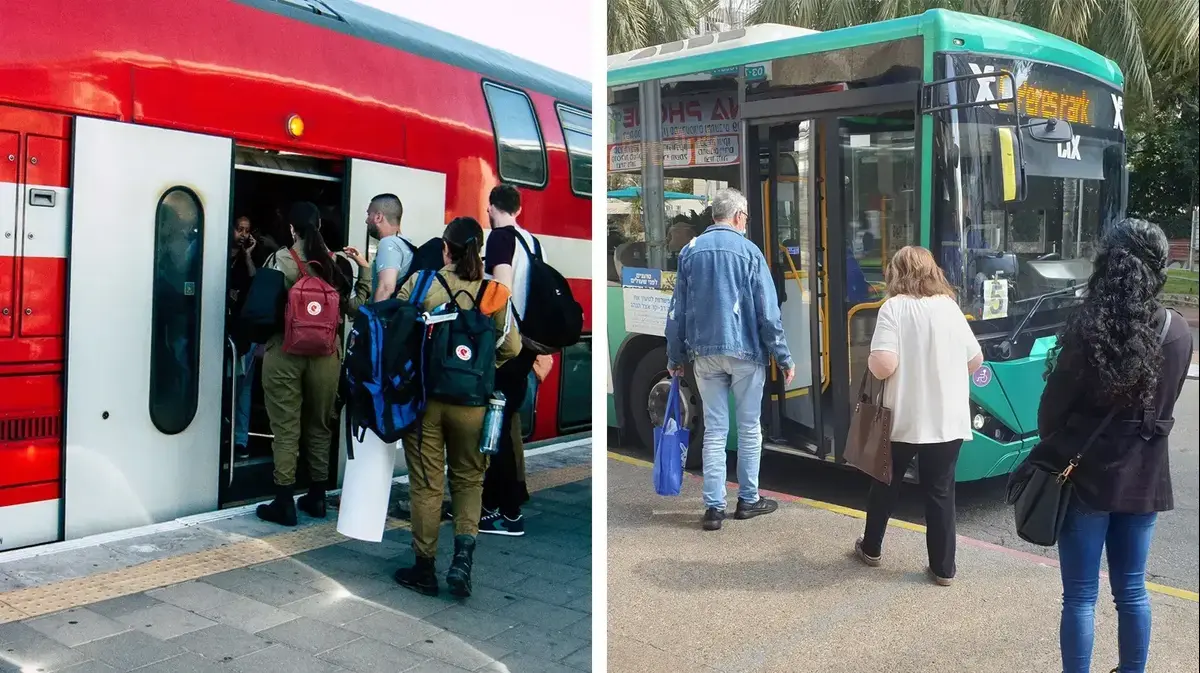A bus on Saturday in Tel Aviv operated by Noa Tnua (Photo: Moti Meiri)
After Noa Tnua's Shabbat lines succeeded, the municipalities took responsibility (Photo: Noa Tnua)
Last December, she vacated the office of Transportation Minister Merav Michaeli, who had promised to promote public transportation on Shabbat, albeit without real success, and was replaced by Miri Regev, who opposes it for reasons of maintaining the status quo. In January, several Shas Knesset members submitted a bill, which had already been proposed in previous sessions, that would prohibit the operation of buses and minibuses on Shabbat, not only by the government.
Nonetheless, this week the Mevaseret Zion Council announced the operation of the first Shabbat line to Tel Aviv, together with the adjacent Mateh Yehuda and Abu Ghosh councils. Mevaseret thus became the first community outside the Dan region to join the Naim Weekend project operated by the local authorities in the center on Fridays and Saturdays, as an alternative to the regular public transportation system that is shut down for political reasons.
Despite the heavy pressure exerted by the ultra-Orthodox parties against public activity on Shabbat, despite the attempt at the legal revolution, the project has survived for four years in partnership with the municipalities of Givatayim, Hod Hasharon, Kfar Saba, Modi'in-Maccabim-Reut, Kiryat Ono, Ramat Hasharon, Shoham and Tel Aviv-Yafo. At the same time, the Ramat Gan and Herzliya municipalities operate their own Shabbat lines, without joining the neighboring project, about half of whose budget is funded by the Tel Aviv municipality.
In total, about 40,35 people travel on the Shabbat lines operated by the local authorities, joining about <>,<> people who travel on the only public transportation lines operated by the state, in Haifa Bay for historical reasons of such lines that operated even before the establishment of the state, and in Eilat, where there is a limited public transportation service in the city and to Sde Ramon officially for tourists.
Naim's bus on the weekend (Photo: Guy Yehieli)
"The Shabbat line that began operating will not stop," is sure Roy Schwartz High School, chairman of Noa Tnua, which began operating these lines eight years ago, before they were adopted by local authorities. Schwartz High School and the team he organized were the first to crack the legal prohibition on operating public transportation on Shabbat – the government, as stated, does not operate lines in most of the country itself, and has prohibited by law the transportation of passengers for a fee on any entity other than taxi drivers. Schwartz High School, the grandson of former Knesset Speaker Dan High School and an economist by profession, circumvented the ban by operating the buses by cooperative societies, of which passengers were members, and paid them membership fees.
"There is no other country that paralyzes public transportation for 20% of the week. There is no other country that insists on not checking the need for public transportation on Shabbat, and that those working in the field in academia stay away from such an examination, for fear that it will anger those who could burden them with research budgets and advisory positions to the government. Even in European countries where almost all commercial activity is closed on weekends for reasons of workers' rights, public transport operates, according to needs. There's no argument about that at all. We also don't need public transportation on weekends on weekdays, and we don't need to pass through ultra-Orthodox areas. Activity on Friday and Saturday should be about 25% higher than the rest of the week."
Including train?
"Light rail yes, but heavy rail is not safe. On intercity routes, buses provide a more flexible service."
Michaeli, who supported public transportation on Shabbat, changed nothing but declarations about operating the light rail on Shabbat: the cable car in Haifa, which was inaugurated during its tenure, is shut down on weekends, and the regulation that was supposed to authorize payment for rides on Shabbat and make it easier for municipalities to expand Shabbat buses, stalled.
"I accompanied this regulation from the very beginning. I thought she had a 5% chance and that was more than nothing, but she went through several incarnations but in the end fell because of the opposition of the Justice Ministry, the opposition of Nir Orbach and the fall of the Bennett government. But it is possible to expand government Shabbat lines without changing the law, by virtue of the authority of transport ministers to approve lines that operate to hospitals."
The new partners: Meital Lehavi, Deputy Mayor of Tel Aviv, Yoram Shimon, Mayor of Mevaseret Zion, Yehuda Niv Wiesel and Mayor of Abu Ghosh Salim Jaber (Photo: Tel Aviv Municipality)
In cities that already operate Shabbat lines, isn't there concern that if the incumbent mayor loses the local elections in November, the activity will stop?
"As far as the residents are concerned, this is a real need. Not all mayors understand this, but those who do understand and find the money and the right coalition for it earn important points in the public. Relative to the cost of investment per resident, it's much cheaper than artists' performances."
So will we see more new lines before the elections?
"As in pre-election government, mayors are also limited in their activities in the pre-election period. But it will come up in domestic circles, and in the programs presented by the candidates."
How much does such a service cost municipalities?
"A bus a day including a driver costs about NIS 3,000, with prices varying according to the season, in summer they are cheaper because there is less demand for transportation, in winter it's the other way around. You need at least two buses on each line to reach a frequency of at least once an hour, and you need to operate 60 days a year, every weekend and holiday. And there needs to be someone to manage and supervise the service, so that the buses leave on time and make the route, just like any public transportation service is supervised. Intercity Shabbat lines will be a little more expensive to operate."
Schwartz High School (30) and Noa Tnua advise municipalities on operating the service, connect cities that want to join, conduct surveys and studies that accompany the activity. He himself is also active in the Likud movement. "I don't get a shekel from the activity. We are talking with MKs, ministers and mayors."
In the current government, the ultra-Orthodox parties have more power than in previous governments.
"In Religious Zionism, there is a prominent approach that says if we don't do things ourselves, we will be forced to lead, then it is better to lead and control the pace and scope. If the Likud had been joined, and then it could have descended on Meretz that it succeeded where it failed and is important to its voters. But legal reform took over the agenda, followed by budget discussions. I hope that now it will be possible to find the political time for this. I'm optimistic about everything, but as we've seen, there are also government-bypassing routes to these services."
How come cities like Rishon LeZion, Holon or Be'er Sheva didn't join Naim over the weekend?
"In no city have we received a total refusal. In the end, this need is accepted and understood by both the right and the left, among everyone except the ultra-Orthodox. Every city has its own pace and priorities."
Do you do this activity as a Likud member?
"I am the chairman of the Tnua movement and there are people here from all parties. In the Likud, I lobby as a shepherd, not as chairman of the association."
What surprised you about the activity?
"It's fun to see people on Saturday waiting for the bus with a smile. And even more tourists, who on Shabbat march to her wedding in the most natural way for them. As far as the state is concerned, public transportation on Saturday would dramatically reduce the costs of vacations for tourists here, save the need for expensive car rental, solve the problem of traffic to Ben Gurion Airport, which is very expensive on weekends now. Any investment in public transportation on Shabbat would return to the state in the form of additional tourism. It is also a measure that reduces the cost of living for Israeli citizens as well, can save the second car at home and sometimes even the first."
- Car
- Car News
Tags
- Public transportation on Saturday









